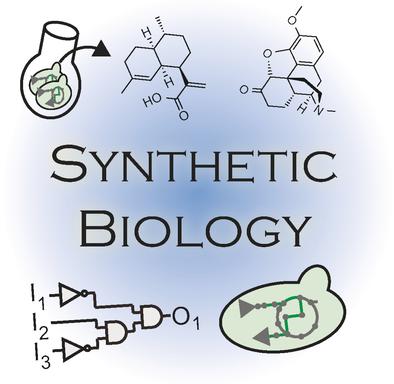当前位置:
X-MOL 学术
›
Angew. Chem. Int. Ed.
›
论文详情
Our official English website, www.x-mol.net, welcomes your feedback! (Note: you will need to create a separate account there.)
Synthetic Biology—The Synthesis of Biology
Angewandte Chemie International Edition ( IF 16.6 ) Pub Date : 2017-04-25 08:30:50 , DOI: 10.1002/anie.201609229 Simon Ausländer 1 , David Ausländer 1 , Martin Fussenegger 1, 2
Angewandte Chemie International Edition ( IF 16.6 ) Pub Date : 2017-04-25 08:30:50 , DOI: 10.1002/anie.201609229 Simon Ausländer 1 , David Ausländer 1 , Martin Fussenegger 1, 2
Affiliation

|
Synthetic biology concerns the engineering of man-made living biomachines from standardized components that can perform predefined functions in a (self-)controlled manner. Different research strategies and interdisciplinary efforts are pursued to implement engineering principles to biology. The “top-down” strategy exploits nature's incredible diversity of existing, natural parts to construct synthetic compositions of genetic, metabolic, or signaling networks with predictable and controllable properties. This mainly application-driven approach results in living factories that produce drugs, biofuels, biomaterials, and fine chemicals, and results in living pills that are based on engineered cells with the capacity to autonomously detect and treat disease states in vivo. In contrast, the “bottom-up” strategy seeks to be independent of existing living systems by designing biological systems from scratch and synthesizing artificial biological entities not found in nature. This more knowledge-driven approach investigates the reconstruction of minimal biological systems that are capable of performing basic biological phenomena, such as self-organization, self-replication, and self-sustainability. Moreover, the syntheses of artificial biological units, such as synthetic nucleotides or amino acids, and their implementation into polymers inside living cells currently set the boundaries between natural and artificial biological systems. In particular, the in vitro design, synthesis, and transfer of complete genomes into host cells point to the future of synthetic biology: the creation of designer cells with tailored desirable properties for biomedicine and biotechnology.
中文翻译:

合成生物学-生物学的综合
合成生物学涉及人造生命生物机器的工程化,该工程化生物利用标准组件以(自控)方式执行预定义的功能。追求不同的研究策略和跨学科的努力,以实现生物学的工程原理。“自上而下”的策略利用了自然界现有的自然部分的惊人多样性,以构建具有可预测和可控制特性的遗传,代谢或信号网络的合成成分。这种主要由应用程序驱动的方法导致生产药物,生物燃料,生物材料和精细化学品的有生命的工厂,并产生基于工程细胞的有生命的药丸,这些细胞具有自主检测和治疗体内疾病状态的能力。相比之下,“自下而上”战略旨在通过从头开始设计生物系统并合成自然界中未发现的人工生物实体,来独立于现有的生命系统。这种以知识为主导的方法研究了能够执行基本生物学现象(例如自我组织,自我复制和自我可持续性)的最小生物学系统的重建。此外,目前,人工生物单位(例如合成核苷酸或氨基酸)的合成及其在活细胞内部的聚合物中的实现为天然和人工生物系统之间的界限设定了界限。特别是,完整基因组的体外设计,合成和转移到宿主细胞中,预示着合成生物学的未来:
更新日期:2017-05-24
中文翻译:

合成生物学-生物学的综合
合成生物学涉及人造生命生物机器的工程化,该工程化生物利用标准组件以(自控)方式执行预定义的功能。追求不同的研究策略和跨学科的努力,以实现生物学的工程原理。“自上而下”的策略利用了自然界现有的自然部分的惊人多样性,以构建具有可预测和可控制特性的遗传,代谢或信号网络的合成成分。这种主要由应用程序驱动的方法导致生产药物,生物燃料,生物材料和精细化学品的有生命的工厂,并产生基于工程细胞的有生命的药丸,这些细胞具有自主检测和治疗体内疾病状态的能力。相比之下,“自下而上”战略旨在通过从头开始设计生物系统并合成自然界中未发现的人工生物实体,来独立于现有的生命系统。这种以知识为主导的方法研究了能够执行基本生物学现象(例如自我组织,自我复制和自我可持续性)的最小生物学系统的重建。此外,目前,人工生物单位(例如合成核苷酸或氨基酸)的合成及其在活细胞内部的聚合物中的实现为天然和人工生物系统之间的界限设定了界限。特别是,完整基因组的体外设计,合成和转移到宿主细胞中,预示着合成生物学的未来:



























 京公网安备 11010802027423号
京公网安备 11010802027423号